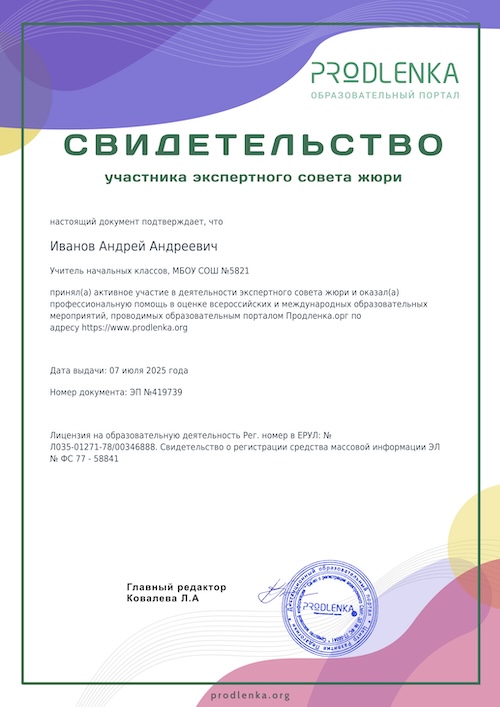Свидетельство о регистрации
СМИ: ЭЛ № ФС 77-58841
от 28.07.2014
Преимущества публикации работ учащихся
- Мотивация и развитие – ученики видят ценность своего труда, учатся ясно выражать мысли, а педагоги демонстрируют эффективность своих методов.
- Репутация и карьера – публикации укрепляют портфолио учащихся и повышают престиж учебного заведения.
- Обратная связь и рост – учителя и ученики получают внешнюю оценку, что стимулирует дальнейшее развитие.
Свидетельство автора
Диплом руководителя
Дождитесь публикации материала, после чего оформите свидетельство автора о публикации в СМИ и диплом для
руководителя.
Повышение квалификации
- Курс-практикум «Педагогический драйв: от выгорания к горению»
- «Труд (технология): специфика предмета в условиях реализации ФГОС НОО»
- «ФАООП УО, ФАОП НОО и ФАОП ООО для обучающихся с ОВЗ: специфика организации образовательного процесса по ФГОС»
- «Специфика работы с детьми-мигрантами дошкольного возраста»
- «Учебный курс «Вероятность и статистика»: содержание и специфика преподавания в условиях реализации ФГОС ООО и ФГОС СОО»
- «Центр «Точка роста»: создание современного образовательного пространства в общеобразовательной организации»
«English Calendar.What do the names of the days of the Week and of the months mean?»
Hello, my name is Kseniya Androsova, I’m in the class 9V from school № 40. When we do the calendar, we learn the months, the dates, the years. Every week, day has a name. There are lots of numbers that look the same. Every day people try to remember what day is, what month is. People write notes, they do tasks, but they don't think what days' and months' mean.
I'd like to understand the meaning of days' and months' titles, their numbers and orders.
So, the theme of my research is English calendar and etymology of days of the week and months. It is very interesting to know the history of emergence of their titles.
I think that theme of my work is actual because all people use these words every day. Students write them at lessons and sometimes they do mistakes in these ones. Also, it's so wonderful to open the secrets of the words.
The goal of my work is studying of origin of months' and days' titles in the English language. To reach the goal I offer the next tasks:
1. Study the literature about problem.
2. Find history of months' and days' names.
3. Conduct a quiz to know students awareness of this subject.
4. Establish and start using training aids for 3-5 classes.
According to the foregoing I hypothesize:"Days' of the week and months' titles were occurred from gods' names, that's why we use capital letters to write them.
During exploration we have found different interesting facts. The Calendar is an indispensable part of everyday life. Calendars allow man to track passing time and to prepare for the future. Calendars help man know when to plant, when to prepare for festivals and other important events, when to prepare for harsh weather, when to celebrate his religion, his own birthday and much more.
The first calendar was created to monitor weather changes by Egyptians in about 5 thousand years BC. Religion has played a major part in the development of the Calendar.
People followed to the Church. It dictated when they had to work and when they may have rest.
The ancestor of the modern calendar is the Julian calendar , which was introduced by Julius Caesar in 45 BC. The successor to the Julian calendar (old style) is Gregorian calendar (new style), introduced in 1582 on the initiative of Pope Gregory.
According to our research:
1)The first day of the week (for many), Sunday has been set aside as the “day of the sun” since ancient Egyptian times in honor of the sun-god, Ra. The Egyptians passed their idea of a 7-day week onto the Romans, who also started their week with the Sun’s day.
This is the international standard, several countries, including the United States, Canada, and Australia consider Sunday as the start of the week.
2) MONDAY - Moon's Day. Like Sunday, Monday was named by the Romans after the Moon. The Latin term was 'dies Lunae' or 'Day of the Moon'.
3) TUESDAY - Tyr's Day. In the Roman world Tuesday was dedicated to the Roman God of War. The Germanic version of Tyr was Tiw, or Tiu and later 'Tuesday'.
4) WEDNESDAY - Woden's Day. Wednesday was originally named for the Roman Messenger of the Gods, Mercury. This became Wednesdai in the Middle Ages, and later 'Wednesday'.
5) THURSDAY - Thor's Day. Thursday was originally named for the supreme Roman God, Jove, or Jupiter. Later developing into 'Thursday'.
6) FRIDAY - Freya's Day. Friday was originally named by the Romans after Venus. The Old English language developed into 'Fridai' in the Middle Ages, and eventually this became 'Friday'.
7) SATURDAY - Saturn's Day. Saturday is Saturn's Day, named after the Roman God of time.
Almost all these days are owned by various gods, and the ancestors of the English people revered and respected them.
Also we have known the history of months’ origin.
1 ) JANUARY - The Month of Janus, the Roman God of the gateway
2 ) FEBRUARY - The Month of Februa, the Roman Festival of Purification
3 ) MARCH - The Month of Mars, the Roman God of War
4 ) APRIL - The Month of Aprilis, which means 'opening' (of leaves and buds)
5 ) MAY - The Month of Maia, Greco-Roman Goddess of Spring and Fertility
6 ) JUNE - The Month of Juno, the principal Roman goddess
7 ) JULY - Named in honour of Roman dictator, Julius Caesar
8 ) AUGUST - Named in honour of Roman emperor, Augustus Caesar
9 ) SEPTEMBER - Named simply as 'the 9th month of the year'
10) OCTOBER - Named simply as 'the 10th month of the year'
11) NOVEMBER - Named simply as 'the 11th month of the year'
12) DECEMBER - Named simply as 'the 12th month of the year’
We have asked 130 pupils of the 3d and the 5th classes to research their knowledges of days’ and months’ names.
According to these questionnaire we have found next:
89 % of students know number of months. 84 % of students are sure that March starts spring. 72% of learners answered that January is the first month of the year.
8% of students don’t know how many days there are in the week.
41 % of respondents know that Sunday is the first day of the week.
Exposure to literature, history of days’ and months’ origin gives me rights to confirm our hypothesis which was put forward at the beginning of our work, that “Days' of the week and months' titles were occurred from gods' names, that's why we use capital letters to write them”.
We decided to create booklet for students of 3-5 grades to help them remembering days’ and months’ names. The booklet has many tasks, idioms, the meaning of “idiom” and there is also a story of creating the poems about week days. We think these exercises will help students and their teachers.
I'd like to understand the meaning of days' and months' titles, their numbers and orders.
So, the theme of my research is English calendar and etymology of days of the week and months. It is very interesting to know the history of emergence of their titles.
I think that theme of my work is actual because all people use these words every day. Students write them at lessons and sometimes they do mistakes in these ones. Also, it's so wonderful to open the secrets of the words.
The goal of my work is studying of origin of months' and days' titles in the English language. To reach the goal I offer the next tasks:
1. Study the literature about problem.
2. Find history of months' and days' names.
3. Conduct a quiz to know students awareness of this subject.
4. Establish and start using training aids for 3-5 classes.
According to the foregoing I hypothesize:"Days' of the week and months' titles were occurred from gods' names, that's why we use capital letters to write them.
During exploration we have found different interesting facts. The Calendar is an indispensable part of everyday life. Calendars allow man to track passing time and to prepare for the future. Calendars help man know when to plant, when to prepare for festivals and other important events, when to prepare for harsh weather, when to celebrate his religion, his own birthday and much more.
The first calendar was created to monitor weather changes by Egyptians in about 5 thousand years BC. Religion has played a major part in the development of the Calendar.
People followed to the Church. It dictated when they had to work and when they may have rest.
The ancestor of the modern calendar is the Julian calendar , which was introduced by Julius Caesar in 45 BC. The successor to the Julian calendar (old style) is Gregorian calendar (new style), introduced in 1582 on the initiative of Pope Gregory.
According to our research:
1)The first day of the week (for many), Sunday has been set aside as the “day of the sun” since ancient Egyptian times in honor of the sun-god, Ra. The Egyptians passed their idea of a 7-day week onto the Romans, who also started their week with the Sun’s day.
This is the international standard, several countries, including the United States, Canada, and Australia consider Sunday as the start of the week.
2) MONDAY - Moon's Day. Like Sunday, Monday was named by the Romans after the Moon. The Latin term was 'dies Lunae' or 'Day of the Moon'.
3) TUESDAY - Tyr's Day. In the Roman world Tuesday was dedicated to the Roman God of War. The Germanic version of Tyr was Tiw, or Tiu and later 'Tuesday'.
4) WEDNESDAY - Woden's Day. Wednesday was originally named for the Roman Messenger of the Gods, Mercury. This became Wednesdai in the Middle Ages, and later 'Wednesday'.
5) THURSDAY - Thor's Day. Thursday was originally named for the supreme Roman God, Jove, or Jupiter. Later developing into 'Thursday'.
6) FRIDAY - Freya's Day. Friday was originally named by the Romans after Venus. The Old English language developed into 'Fridai' in the Middle Ages, and eventually this became 'Friday'.
7) SATURDAY - Saturn's Day. Saturday is Saturn's Day, named after the Roman God of time.
Almost all these days are owned by various gods, and the ancestors of the English people revered and respected them.
Also we have known the history of months’ origin.
1 ) JANUARY - The Month of Janus, the Roman God of the gateway
2 ) FEBRUARY - The Month of Februa, the Roman Festival of Purification
3 ) MARCH - The Month of Mars, the Roman God of War
4 ) APRIL - The Month of Aprilis, which means 'opening' (of leaves and buds)
5 ) MAY - The Month of Maia, Greco-Roman Goddess of Spring and Fertility
6 ) JUNE - The Month of Juno, the principal Roman goddess
7 ) JULY - Named in honour of Roman dictator, Julius Caesar
8 ) AUGUST - Named in honour of Roman emperor, Augustus Caesar
9 ) SEPTEMBER - Named simply as 'the 9th month of the year'
10) OCTOBER - Named simply as 'the 10th month of the year'
11) NOVEMBER - Named simply as 'the 11th month of the year'
12) DECEMBER - Named simply as 'the 12th month of the year’
We have asked 130 pupils of the 3d and the 5th classes to research their knowledges of days’ and months’ names.
According to these questionnaire we have found next:
89 % of students know number of months. 84 % of students are sure that March starts spring. 72% of learners answered that January is the first month of the year.
8% of students don’t know how many days there are in the week.
41 % of respondents know that Sunday is the first day of the week.
Exposure to literature, history of days’ and months’ origin gives me rights to confirm our hypothesis which was put forward at the beginning of our work, that “Days' of the week and months' titles were occurred from gods' names, that's why we use capital letters to write them”.
We decided to create booklet for students of 3-5 grades to help them remembering days’ and months’ names. The booklet has many tasks, idioms, the meaning of “idiom” and there is also a story of creating the poems about week days. We think these exercises will help students and their teachers.
Содержимое разработки

Конкурсы для педагогов и воспитателей
Официальные Всероссийские и Международные дистанционные конкурсы. Мероприятия разработаны с учетом рекомендаций Минобрнауки РФ для учащихся и педагогов.
Принять участие
Конкурсы для школьников и дошкольников
Всероссийские конкурсы для дошкольников и школьников (1–11 классы) проводятся по разным направлениям и номинациям. Участвуйте, раскрывайте таланты и достигайте успехов!
Принять участие









































Чтобы оставлять комментарии, вам необходимо авторизоваться на сайте. Если у вас еще нет учетной записи на нашем сайте, предлагаем зарегистрироваться. Это займет не более 5 минут.